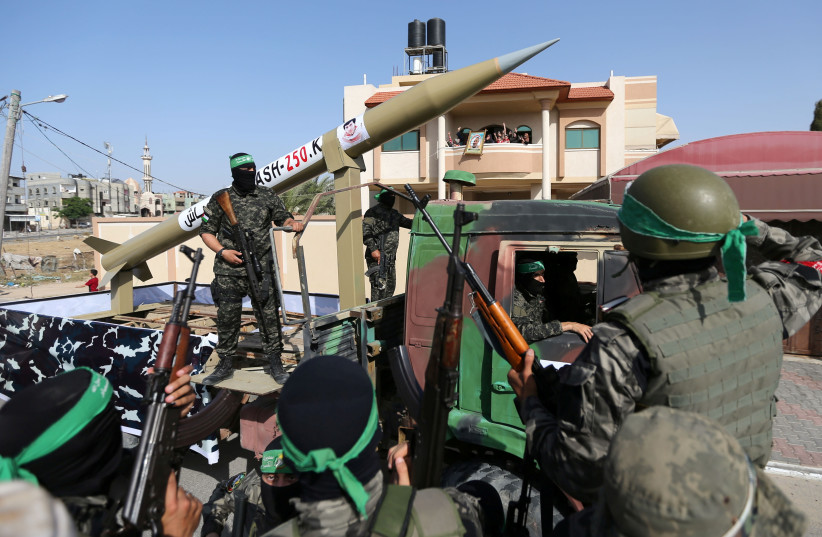The British government’s decision to outlaw Hamas as a terrorist organization will make it more difficult for Palestinian Authority President Mahmoud Abbas to form a Palestinian national unity government, Palestinian sources said on Saturday.
The decision is likely to backfire, increasing Hamas’s popularity among Palestinians and other Arabs and Muslims, the sources said.
On the other hand, there’s also a possibility the decision will increase pressure on the Hamas leadership to display more flexibility in its policies and actions, the sources added.
In recent weeks, reports have surfaced in a number of Arab and Western media outlets claiming the US administration, Egypt and other parties were working toward persuading the Palestinians to end their differences and form a unity government.
The reports referred specifically to the ongoing dispute between Abbas’s ruling Fatah faction and Hamas – a dispute that has effectively separated the West Bank from the Gaza Strip since 2007, when Hamas violently seized control of the coastal enclave.

“The British move complicates matters for the Palestinian leadership and President Abbas,” said a Palestinian official in Ramallah. “It’s now more difficult to talk about a unity government with Hamas when its political leaders have been branded terrorists.”
But it was Abbas who in 2007 issued an order to outlaw Hamas and its “armed militias.”
Abbas’s order, issued at the outset of the Fatah-Hamas rivalry, paved the way for PA security forces to launch a massive crackdown on Hamas members and officials in the West Bank.
Abbas’s order also targeted financial institutions in the West Bank, allowing the PA to seize bank accounts and charities suspected of belonging to Hamas.
Despite the clampdown, Hamas continues to enjoy widespread popularity among Palestinians in the West Bank. And despite Abbas’s order to outlaw Hamas more than a decade ago, he and senior officials from the PA and Fatah have continued to hold talks with the Islamist group’s leaders in a bid to achieve reconciliation.
The British move targeting Hamas may even increase the group’s popularity, depicting it as a victim of an international conspiracy against the Palestinian people in general and the Palestinian “resistance” groups in particular.
“When countries such as the US, Israel and Britain go after Hamas, that boosts Hamas’s standing among Palestinians and many Arabs and Muslims,” said a Ramallah-based Palestinian political analyst.
However, the analyst and other Palestinians said on Saturday that there was a possibility that the British move could increase pressure on the Hamas leadership to change its hardline policies and display pragmatism and leniency in its dealings with the PA, Israel and issues related to the Gaza Strip.
Hamas, nonetheless, is not going to endorse the two-state solution or abandon the “armed struggle” against Israel as a result of the British move.
Meanwhile, the same Abbas who outlawed Hamas and whose forces are continuing to arrest, interrogate and prosecute the group’s members in the West Bank was forced on Saturday to condemn the British decision. Abbas, of course, cannot come out in support of such a decision targeting a major Palestinian faction.
In the past few years, the PA leadership has repeatedly urged Britain to recognize the Palestinian state.
As of July 2019, 138 of the 193 United nations members have recognized a Palestinian state. Many of the countries that do not recognize Palestine as a state, including Britain, support a two-state solution.
Earlier this month, Palestinians marked the 1917 Balfour Declaration that promised to establish a Jewish homeland in Palestine by again calling on Britain to apologize for its “sin” and “crime.” Abbas even ordered Palestinian flags flown at half-mast each year marking the anniversary of the Balfour Declaration.
That’s why Abbas cannot be seen as siding with the British move against Hamas – days after he ordered the symbolic act in protest of the Balfour Declaration.
A statement issued on Saturday by the Palestinian Ministry of Foreign Affairs said the PA “rejects” and “condemns” the British decision and considers it an act of “capitulation to Israeli pressure and an unjustified assault on the Palestinian people.”
Hamas and several Palestinian factions also denounced the British decision and said that they intend to hold a series of rallies in protest of the move. The factions said after an emergency meeting in the Gaza Strip that the British decision gives a green light to Israel “to continue its aggression and crimes” against the Palestinians.
